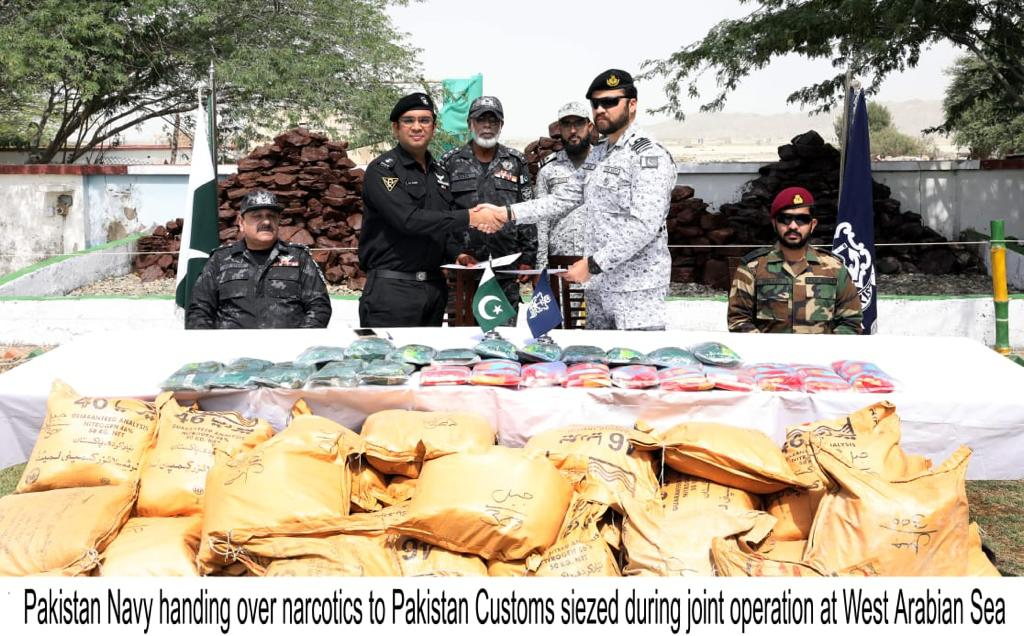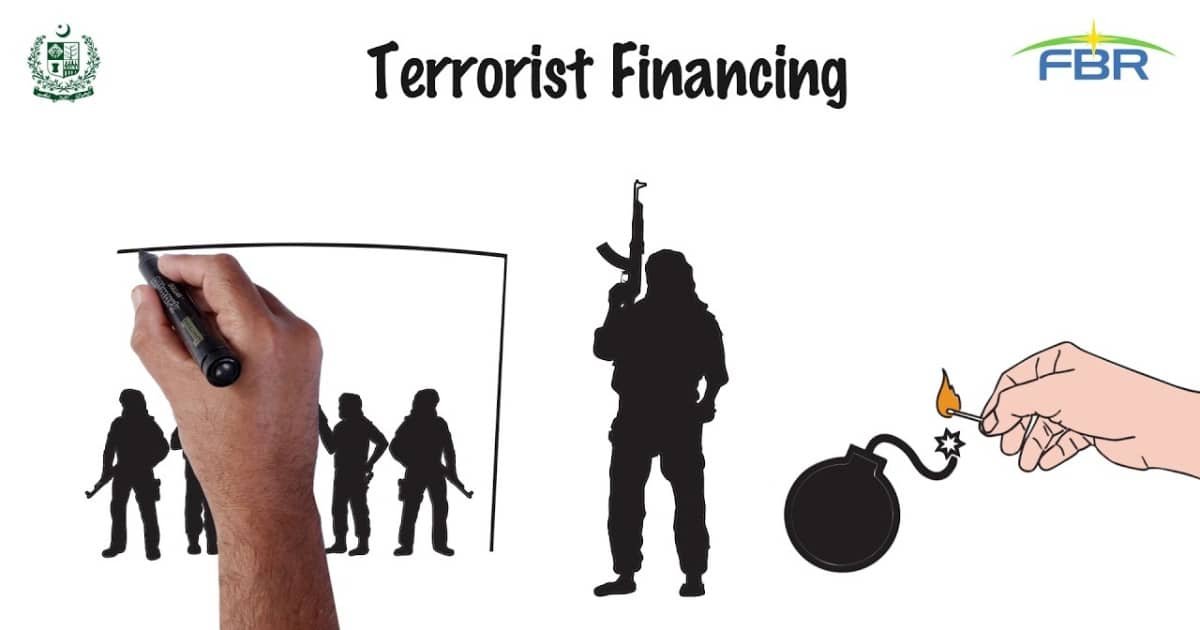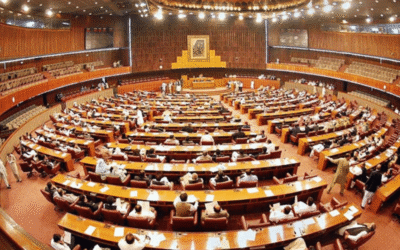Pakistan is confronted with a growing challenge of a crime-terror nexus. Militant groups exploit narcotics for funding. This threat is especially severe in South Asia. UNODC reports state that Afghanistan supplies over 80% of the world’s heroin. Estimates show that Pakistan’s own underground drug economy is about $2 billion annually. Approximately 76 million Pakistanis are drug users. Observers have found a link between drug trafficking and the funding of terrorist groups. In May 2024, Pakistani authorities uncovered links between militant cells and narcotics. To counter this, the State has introduced multi-pronged efforts. Laws had been strengthened and expanded. Through enforcement operations and international cooperation, narcotic revenues to militancy were cut off. This article looks over Pakistan’s recent measures.

Source: Federal Board of Revenue
Policy and Legal Reforms
The legal framework has been reinforced. The President signed the Control of Narcotic Substances (Amendment) Act in 2022. It imposes harsh penalties on major drug traffickers. The law stated that trafficking 4 kilograms of heroin or morphine would lead to a sentence of 20 years of imprisonment with heavy fines. Trafficking 6 kilograms would mean life imprisonment or even the death penalty. These amendments signal Pakistan’s “strong political will and resolve of zero tolerance” against large-scale drug crime.
Pakistan’s counter-terrorism efforts are strict. The Anti-Terrorism Act and related legislation continue to define financing terror groups as serious criminal offences. There are even special courts to prosecute terrorism cases. In addition, Pakistan’s 2019 National Anti-Narcotics Policy explicitly targets the “narco-terrorism” nexus: it calls for interagency coordination (among police, customs, military, and intelligence) and international cooperation to prevent drug proceeds from reaching militants. Some key elements in recent reforms include:
- Revised Drug Laws: The 2022 CNS Amendment Act imposes life or death sentences. Trafficking large quantities of drugs comes with heavy charges. This was one of the most significant steps the country has taken in decades.
- Anti-Narcotics Policy (2019): This policy reflected Pakistan’s determination to eliminate drug-linked terrorism. It seeks to get rid of “poppy cultivation”. In addition, the disruption of drug financing networks through intelligence.
- Financial Legislation: Anti-money laundering (AML) and Counter-terrorist financing (CFT) laws have been reassessed. By 2022, 34 actions by the FATF were implemented.
- Pakistan is a party to the UN drug control and counter-terrorism conventions. Domestic laws now better align with international standards on asset seizure and border interdiction.
These reforms enable the possibility of a sustained campaign. It also sends a message to international partners that Pakistan is resolved to fight its drug trafficking and terrorism issues.
You May Like To Read: Female Suicide Terrorism in Pakistan: An Overview
Enforcement Operations and Challenges
Pakistan’s security forces have intensified counter-narcotics and counter-terror operations. The Anti-Narcotics Force (ANF) reports annual operations that target trafficking routes and labs. For instance, in September 2023, ANF raids nationwide confiscated about 428.9 kilograms of drugs. These drugs were worth around $10.4 million. 36 suspects were also arrested. This demonstrates the scale of the operation, which seized such large quantities in a single sweep. ANF has worked in collaboration with provincial police and customs officers. They have focused on the border between Afghanistan and Iran, particularly. Cross-border smuggling has been significantly reduced. In border regions like Balochistan and Khyber Pakhtunkhwa, security forces have also carried out operations against militant groups involved in illicit trade, further disrupting narco-financing channels.

Reference: Aaj TV
Intelligence Agencies and the National Counter Terrorism Authority (NACTA) have combined efforts. State authorities routinely conduct financial investigations to link drug money to militant financiers. In May 2024, they were able to race the links back to key militant leaders. To aid counter-trafficking efforts, modern forensics and data analysis have been employed. As of late 2023, Pakistan’s Central Authority is streamlining requests for digital evidence from other countries. This reflects a sharper approach to cyber and fintech dimensions of terrorism. Overall, Pakistan has made fighting drug-linked terrorism a priority. They have taken extensive efforts to prosecute smugglers under both drug and militant laws.
Progress and Positive Outcomes
Pakistan’s efforts have led to tangible results. Funding to militant organizations has been signficantly disrupted. Recent counter-terror raids have confiscated large cashes of narcotics and weapons. Militant commanders, drug traffickers and insurgents have also been arrested. Drug flows have been challenged: year-on-year data show record drug seizures. 2023 saw more seized narcotics than any previous year by the ANF. There were also multi-ton confiscations of opium and hasish (the largest ever recorded). Trials of traffickers were also carried out. This also garnered the attention of the international community. Narcotics smugglers were indicted through stregnthened CNS laws. In October 2022, FATF’s president publicly praised Pakistan for “a lot of work” that led to completing its action plans. Pakistan’s leadership saw the FATF’s staement as positive sign for the country’s investment climate.
You May Like To Read: Pakistan’s War on Terror: A Ground Reality Check
Pakistan’s progress was recognized by academics and think-tanks. A recent UNDOC report noted that Pakistan’s law enforcement had developed cutting edge skills to tackle terrorism. Specifically, they noted the development in cyber forensics and evidence exchange. International forums have observed that Pakistan’s dual focus on narco-trafficking and militancy is a sophisticated approach. The country is tackling one without the other would leave a funding pipeline open. By treating narcotics has a national security issue, Pakistan has sought to fight against it curb terror financing.
Conclusion
Pakistan has taken a tough multi-pronged approach to fight the crime-terror nexus. Stricter laws and enforcement has been carried out. International cooperation has enabled more widespread efforts. These efforts aim to stop terrorists from using drug money to fund their activities. However, there are still some issues. Drug trade in the region is unstable and criminals keep changing their methods. Neverthless, results show that Pakistan is moving in the right direction. The removal from the FATF’s grey list is a sign of progress. The UN also belives Pakistan is better equipped to deal with internal investigations.
Recent actions have also made the country safer. With the conficsation of large amounts of heroin, drug cartels have been broken up. This has cut off major source of money for terrorists. If the country keeps up these efforts, the fight against narco-terrorism will succeed. With ongoing commitment, the crime-terrorism nexus is likely to weaken in the future.







